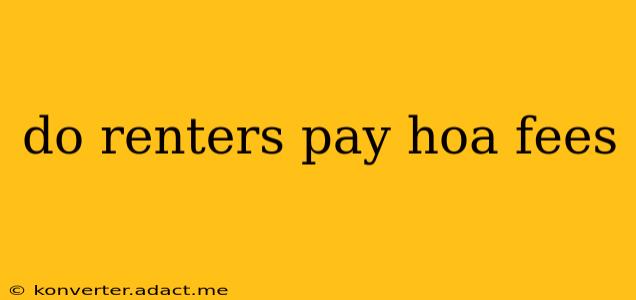Do Renters Pay HOA Fees? The Complexities of HOA Fees and Rental Agreements
The simple answer is: sometimes. Whether or not a renter pays HOA fees depends entirely on the specific terms of their lease agreement and the rules of the homeowner's association (HOA). There's no universal rule. Let's delve into the nuances.
Who Typically Pays HOA Fees?
Generally, homeowners are responsible for paying HOA fees. These fees cover the maintenance and upkeep of shared amenities and common areas within the community, such as swimming pools, landscaping, security, and clubhouse facilities. The HOA collects these fees to fund these services.
When Renters Pay HOA Fees:
Renters will usually pay HOA fees when their lease agreement explicitly states so. This is common in situations where:
- The landlord includes the HOA fees in the rent: This is a straightforward arrangement where the monthly rent includes the HOA fee payment. The renter pays one lump sum to the landlord, who then pays the HOA. This is the most common scenario where a renter pays HOA fees.
- The lease specifies a separate payment: The lease agreement might stipulate that the renter is responsible for paying the HOA fees directly to the association, in addition to the rent. This is less common but still possible.
- The renter is responsible for specific HOA-related charges: Sometimes, a lease might outline that the renter is responsible for certain charges associated with HOA-governed amenities or services, even if the landlord pays the main HOA fees. This might include charges for using the pool or other facilities.
When Renters Do NOT Pay HOA Fees:
In most cases, if the lease agreement doesn't mention HOA fees, the renter is not responsible for paying them. The landlord should be covering these costs. This is a crucial point for renters to confirm during the lease signing process.
What Happens if the HOA Fee Isn't Paid?
If the HOA fees aren't paid, regardless of whether the homeowner or renter is responsible, the HOA can take action. This can range from sending late payment notices to placing a lien on the property, potentially leading to legal action. The consequences will ultimately fall on the responsible party as outlined in the lease and HOA rules.
How to Determine Who Pays in Your Specific Situation:
- Carefully read your lease agreement: This is the most important document. It should clearly state who is responsible for paying HOA fees.
- Review the HOA's governing documents: These documents may provide additional clarity regarding responsibilities.
- Ask your landlord or property manager: If there's any ambiguity, directly contacting your landlord or property manager for clarification is essential. This helps prevent misunderstandings and potential conflicts.
Understanding the Implications:
Knowing who pays HOA fees is vital for both renters and landlords. Renters need to understand their financial obligations, while landlords need to ensure they are complying with the HOA rules and their lease agreements. Clear communication and a thorough understanding of the lease are key to avoiding disputes. Transparency from landlords upfront significantly reduces the possibility of misunderstandings later.
